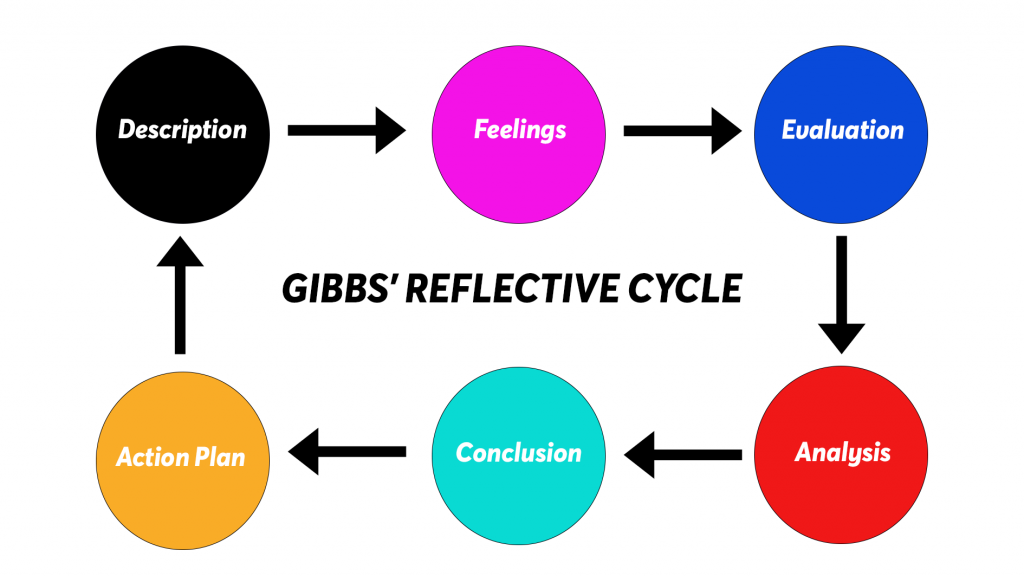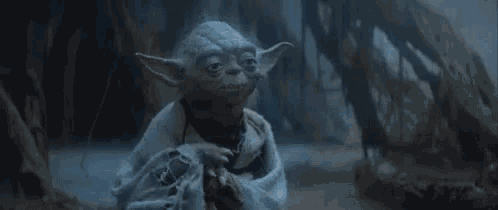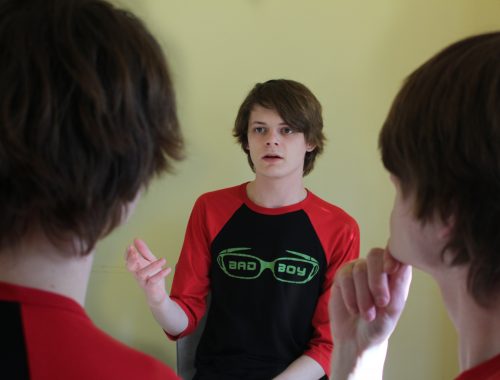2nd Blog Post
Interviews are all about Confidence!

The Scary Stage
In my 1st post I mentioned how “I like to view my CVs the same way I would view my dating profile page. How can I advertise myself to sound interesting? stand out? But most of all suit the job I am applying for in a competitive market?” Well looks like I have past that stage and I am now onto the first date. Job interviews are just like first dates, good first impressions count. Awkwardness can occur and outcomes are unpredictable. One wrong sentence and it could be game over. Sometimes interviews are just all about having confidence and belief in yourself.
In this blog…

I will reflect upon my simulated interview that I took part in during week three of 2nd semester using Gibbs’ Model of reflection once again (Fig 2).
According to Taylor (1986) ‘Reflection is an important human activity in which people recapture their experience, think about it, mull it over and evaluate it. It is working with experience that is important in learning.’
Description
On Thursday 3rd of February I undertook a 4 way simulated interview with my fellow AEL3001 classmates. Each member would take their position in the hot seat while the others prepared questions about the job that they had found and researched ahead of the interview day. Once finished each member gave their thoughts on the candidate including the interviewee writing their own opinion on their performance. Then we switched and the process started again. My job was for a videographer role in a London based company.
Feelings
Just because the interviews were fake it didn’t make them any less real in terms of my thoughts and feelings towards it. In my mind I had to constantly remind myself that these DO NOT MATTER! You are not really speaking to a future employer. If you mess up it’s not a big deal, if you don’t know what to say it’s not a big deal. The important step from this class was to simply put myself into this environment once again, and try to build my confidence for future, more important interviews. At the end of the day, when do you get the chance to go into an interview with zero external pressure on your shoulders. So in a strange, sick sort of way I kind of enjoyed it.
Evaluation
I went into this interview scenario with the idea that once I finish, I can relax. Hence why I went first in my group. I mentioned how you never get the opportunity to have a free hit at an interview. However I never even thought about being able to sit on the bosses seat. I didn’t realise how much I could actually learn from listening to the others and be the one asking the questions. This gave me great insight to how interviewers think of questions and how they can respond to what you say.
Analysis
I honestly didn’t learn a lot from my own performance, it was all just about surviving the 10 minutes I was there for. That’s why asking for feedback is so important after an interview. Luckly for me I didn’t even need to ask. Feedback allows you to understand where it may have wrong but also focuses on the good points that you should continue to build upon. My positive feedback was that I answered the questions very well with great detail. My only real negative response was that I needed to project my voice and hold eye contact better with the interviewer that asked the original question.
Conclusion
“Most of the questions you’re likely to encounter which might traditionally be seen as tough really aren’t that tough at all. If you can see through to the meaning behind the question then it can take a lot of the sting out of a question.”
(Innes 2013: 35)
I felt that I was given great insight to how interviews work and the thinking that goes on behind the closed door as you sit and pounder outside in the waiting room. Overall I think I have improved my self-confidence and communication skills further with the completion of these simulated interviews.
Action Plan
For future Interviews I have learnt that the interviewers are not the enemy. They are trying to help you. After all, they want to hire you! The fear will always be there of course. If you are not nervous going into a pressured environment, there is something wrong. It’s very natural to feel anxious about a job interview. Someone or a group of people are about to judge you on everything about you. But then it’s only human nature so don’t blame them. Sometimes interviewees just want to see how you react to a pressured situation.
“Emotions often interfere with the way we see things”.
Melanie Jasper

“Fail to prepare, prepare to fail” (Fig 3) is a quote I like to live by. Research and planning before going into any interview is so important. When I have the knowledge that I know my stuff this gives me great confidence. When my confidence is high it helps me to relax and therefore I can perform at a high level. You get in life what you work for. Preparation brings confidence, confidence brings results. You must think in a positive manner as wise old Jedi Master once said, “Do or do not. There is no try”. (fig 4) Give 100% and you can walk out knowing you gave everything and if it’s meant to be, it’s meant to be.

Work Cited
Innes, James. The Interview Question & Answer Book Your Definitive Guide to the Best Answers to Even the Toughest Interview Question. Pearson Prentice Hall Business, 2013
Jasper, Melanie. Beginning Reflective Practice. 1st ed. Cengage Learning, 2013. pp. 80-173.
Taylor, Elizabeth. “Reflection: turning experience into learning.” pp 297-298. 1986.
Face to Face-Nowhere to hide
You May Also Like

The interview may have been simulated, but the anxiety was real!
21 February 2022
Shocker, Tom also sucks at interviews!
18 February 2022

